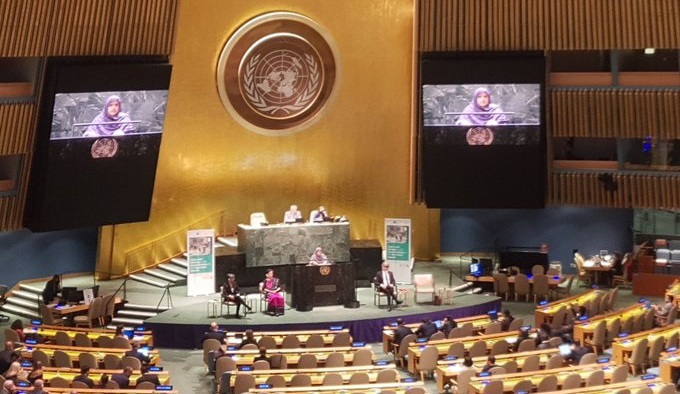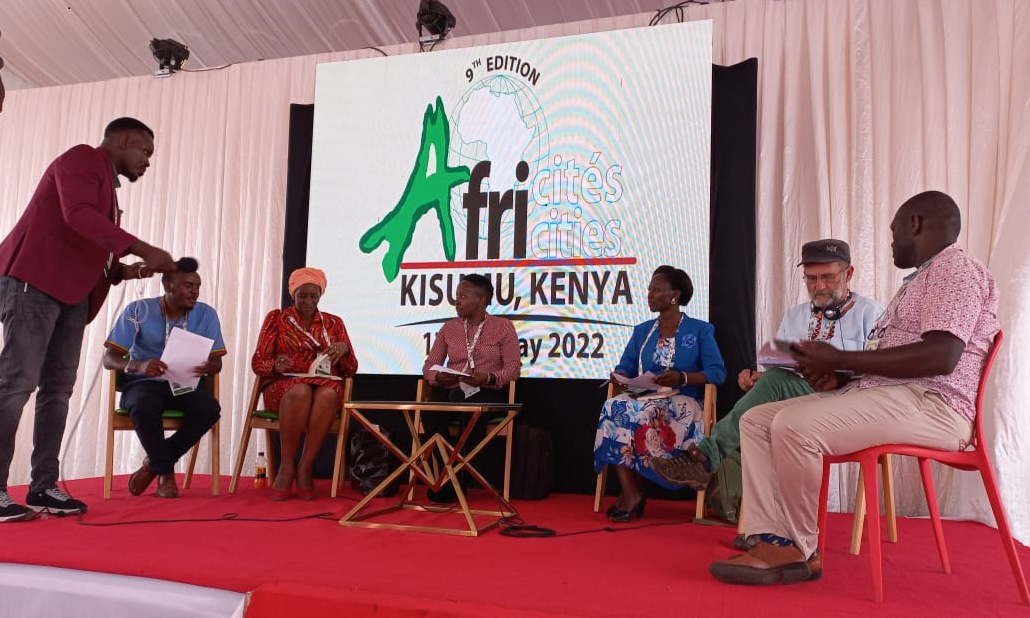WOMEN AND THE CITY DIALOGUE
1. Recognising the commitments made by local governments “to create peaceful, fair, sustainable, and inclusive societies for all, based on solidarity, citizenship and human rights” (Declaration of the Founding Congress of the United Cities and Local Governments, Paris, 2004)
2. Recognising the commitments made by local governments to women, as expressed in CEDAW and other United Nations Conferences -Environment (1992), BEIJING (1995), HABITAT (1996)- commitments that are the result of a consensus between government and civil society, and the product of decades of work by feminist and women’s organizations who have articulated their demands and proposals in respect to the broadening of their rights as citizens.
3. Recognizing the commitment of local governments in IULA’s World Declaration on Women and Local Government (1998) and the Declaration of the Founding Congress of the United Cities and Local Governments (Paris, May 2004).
4.Ratifying the declarations made internationally by feminist and women’s organizations in the monitoring and follow-up processes to the commitments made by local governments worldwide in various United Nations Conferences.
We women call for local governments to:
COMPLY WITH COMMITMENTS MADE
ASSIGN RESOURCES TO ENSURE EFFECTIVE REALIZATION
SHOW ADVANCES MADE BY WAY OF QUANTITATIVELY AND QUALITATIVELY MEASURABLE ACHIEVEMENTS
1. DEMOCRATIC TERRITORIAL MANAGEMENT
“There cannot be democracy without a balanced participation of women and men in representative bodies and local decision making. The participation of women and taking their needs into account with the aim of achieving equality will be at the centre of the agenda of our world organization”
United Cities and Local Governments
Paris, May 5th, 2004.In order to create sustainable, equal and democratic local governments, where women and men have equal access to decision-making, equal access to services and equal treatment in these services, the gender perspective must be mainstreamed into all areas of policy making and management in local government.
IULA Worldwide Declaration on Women and Local Government.
Zimbawe 1998.
In order to make this effective, we women make a call to action and state the need for the following measures:
- Affirmative Legislation, Gender Quota Laws that guarantee the participation of women at the highest levels of decision making in local government: executive and legislative, as well as on councils, and neighborhood associations, in order to support the development of feminine leadership.
- Formal recognition of feminist and women’s organizations as interlocutors of local government, for decision making in relation to public policy, and specifically for physical city planning (provision of services and infrastructure, urban security, housing projects, public spaces). Thus, allowing for the institutionalization of procedures for consultation and participation that guarantee urban policies that are responsive to the differentiated and specific needs of both female and male citizens.
- The institutionalization of women’s machineries as a structure of local city government with their own budget, thus guaranteeing gender mainstreaming in all areas of municipal action and in local governments public policies, programs and plans.
- Develop actions that guarantee the conditions for the effective participation of women in decisions concerning the city, environmental legislation and local development, keeping in mind the obstacles to participation on an equal basis (cultural stereotypes, unequal distribution of work within the family, unemployment, female sole heads of household, age, social condition, discrimination by nationality, ethnicity, sexual orientation).
- Implement public policies that support the transformation of the division of labor in the private sector, and the modification of the dichotomy between public and private activities and the cultural changes necessary.
- Draw up participatory gender sensitive budgets that guarantee the participation of women and their organizations in defining priorities for the allocation of funds and public investments within city territory, while taking into account their social, ethnic and cultural diversity, as well as their age group.
- Incorporate finding from investigations on the use of time into official statistics, making the economic contributions of women visible, contributions that are realized through the production of goods and services in the home, community activities and social politics, and that are based on women’s time and non-remunerated work. The work and activities organized by women in order to improve the conditions of their community should be remunerated with just pay and social security benefits.
- Develop urban gender indicators, providing information on the quality of life in cities for both female and male citizens, in terms of access to different services, and that at the same time, allow for controls over the effective compliance of commitments made by government to assure the equality of women and men in their access to and appropriation of the city.
2. SUSTAINABLE CITIES AS A HUMAN RIGHT
The Right To The City interconnects and is interdependent with all recognized International Human Rights. It was conceived as an integrated right. Therefore, it comprehends: the right to land, ways of subsistence, work, health, education, culture, housing, social protection, security, healthy environment, sanitation, public transportation, leisure, information,
World Charter for the Right to the City
Signed by various organizations and social movements.
WSF, Porto Alegre 2002.
In order to achieve this goal, we women make a call to action and state the need for the following measures:
1. Access to secure tenure of housing and urban services
- Promote affirmative actions that allow for equal rights between women and men, recognizing that in order to revert situations of subordination and inequity, it is necessary to accompany existing legislation providing for equal rights between men and women with cultural transformation (practices and traditions).
- Implement Housing Policies that contemplate the differential social insertion of women, fundamentally those from poorest sectors of the informal economy and likewise those in different situations of social vulnerability: women displaced due to armed conflict, immigrants, females solely responsible for their households.
- Incorporate perspectives of cultural and ethnic diversity into public housing policies, eliminating all forms of discrimination in the access to housing, credits and subsidies, on the basis of sex, age, ethnicity, sexual orientation, creed or nationality, paying special attention to the specific interests of women in the sphere of equity.
- Develop a functional decentralization policy that takes account for the equitable distribution of services and urban equipment in the territory. Likewise, housing policies that contemplate access to interdependent housing services and urban activities that allow for quality of life.
- Prioritize the creation of infrastructure, services and equipment allocated for the dependant population (children, elderly, disabled) whose care has been, and continues to be, the responsibility of women and an obstacle to their full citizenship.
- In city planning, eliminate architectural barriers that hinder the use of the city, that discriminate against and exclude persons with temporary or permanent disabilities, the elderly, etc.
- Effectively control increases in the costs of services and the quality of services provided in the face of an accelerated rate of privatization, guaranteeing all members of society access to public services. At the same time, develop mechanisms to guarantee said access (subsidies and differentiated tariffs), in particular for the most socially excluded sectors, and within these, women. Local government and service providers should jointly assume this responsibility, allowing participation of all social sectors.
- Guarantee access to potable water and drainage, considering their impact on the health of the entire population and especially on women, who are more exposed due to the domestic and community activities that are socially assigned to them, as well as to the consequences on their daily lives (increases in time and efforts). Water is not a commodity and thus should not be privatized or commercialized.
2. Secure and adequate public transport as according to the mobility needs of women
- Generate sex disaggregated information on displacements in the city, through studies on the origin and destination of travels, in order to design public transportation policies responsive to the differentiated needs of men and women facilitating the use, enjoyment and appropriation of the city.
- Incorporate physical security as a condition for the mobility of people into the transportation system, minimizing situations of risk and aggression, especially for women.
3. Secure cities for women, secure cities for all
- Design public policies on urban security that prevent violence against women and children in the city, based on new forms of care and protection of people, that prioritize a preventative and non-repressive focus, involving all social sectors, men and women.
- Integrate urban security as an attribute of physical space in city planning, programs and projects, to promote public spaces, neighborhood environments, city centers, streets, and an urban periphery that is more secure for all citizens.
- Promote campaigns to raise awareness on violence against women in the framework of human rights, directed at the general population, involving different social sectors, the education community and in particular the media who act as principal opinion forming bodies and potential allies to question the cultural stereotypes that legitimate violence against women.
3. Revert situations of social inequity and gender subordination in all spheres of life through cultural transformations
- Commit local governments, to making gender training a priority for civil servants, experts and professionals, in order to allow for gender mainstreaming in the design of public policies, programs and urban projects.
- Commit the education sector in general, and in particular universities, to promote the incorporation of gender as a constitutive part of disciplinary knowledge within different disciplines, and particularly, within architecture and urban planning, and to promote research that allows for transformation of the androcentric vision of the city that currently prevails.
- Commit the media, to establish themselves as principal disseminators of a culture of equity between men and women, questioning stereotypes that promote the subordination of women in society and that consolidate their exclusion from the city.
- Commit men and women to working together towards the creation of a global, just, equal society, shared in solidarity. To achieve this it is necessary to understand that the sexual division of labor is one of the obstacles to the realization of women’s full citizenship. The city, and in particular the organization of space within it as an expression of social and gender relations, can and should promote the necessary cultural changes.


